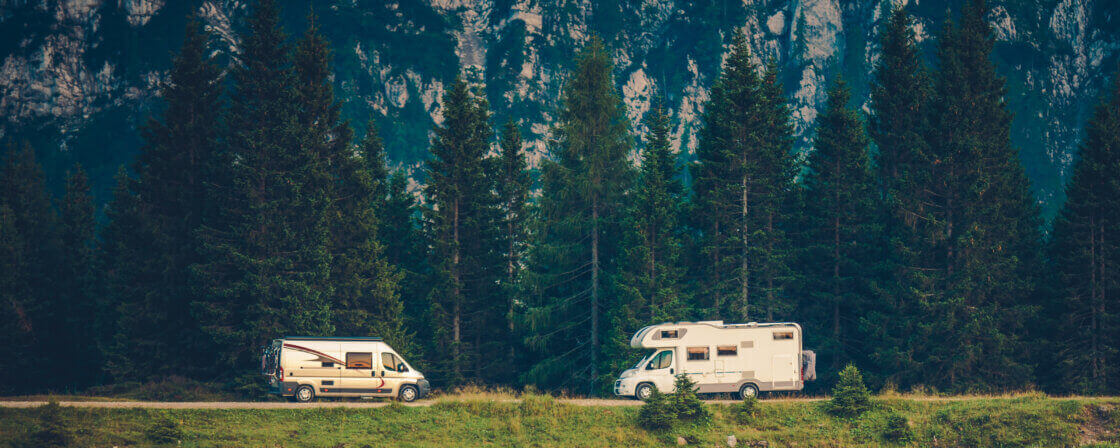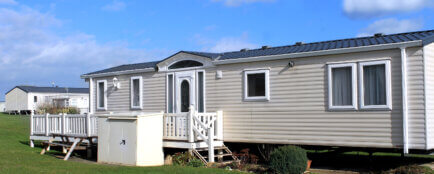Freedom, the road ahead and home on wheels behind you. Does this idea appeal to you? Then you must have thought about buying or renting a motorhome. There are a variety of options on the market, including motorhome sales, caravans, and even second-hand second-hand motorhomes or trailers at bargain prices. For example, if you are looking for cheap motorhomes or small caravans, you can turn to specialist dealers and second hand dealers.
Types of caravans
Motorhomes and cars come in different forms and each one is designed to suit different preferences and needs. Here are the main common types:
Motorhomes
Motorhomes are self-contained, mobile living spaces that combine transportation and accommodation into a single unit (i.e., it is a car permanently attached to the living unit). They are a popular choice for individuals and families who like to move from place to place frequently on the road.
Motorhomes are essentially a home on wheels, equipped with everything needed for comfortable living, including sleeping areas, kitchen facilities, bathrooms and entertainment systems. This allows passengers to cook, sleep and use the toilet without having to rely on external facilities.
Caravans or motorhomes
Caravans are designed to be towed by a separate vehicle, such as a conventional car or SUV. They offer a range of amenities and living spaces, making them a popular choice for individuals and families who want the freedom of a mobile lifestyle without having to invest a significant amount of money in a motorhome.
Caravans do not have their own engine and therefore rely on a separate towing vehicle to which they are attached via a towbar for moving around. The main advantage of this design is the flexibility to detach and use a separate vehicle for on-site transport without having to tow the caravan with it.
Self-built caravans or trailers
This option is becoming increasingly popular. It is the conversion of a conventional vehicle into a motorhome (often vans or discarded buses). These DIY motorhomes can take many forms, from simple, inexpensive spaces to luxurious interiors with energy self-sufficiency.
Tip for article
Tip: There is a big community around self-build vans in the Czech Republic. It gathers for example on the Nomad Facebook page.
How motorhomes are regulated by law
There are a number of rules for motorhomes that must be followed. These rules relate to:
Driving licence
A standard Group B licence will only be sufficient for motorhomes up to 3.5 tonnes. For motorhomes (where the car is fixed to the living space), the 3.5 tonne limit applies for the whole car. For caravans (where the car and living area are separate and connected via a towbar), it is the sum of the weights of the two cars.
If your trailer weighs more than 750 kg and the towing vehicle weighs less than 3.5 tonnes, with the total weight not exceeding 4.25 tonnes, you will need a BE licence. For heavier caravans, you will already need a C1 licence, which allows you to drive caravans weighing up to 7.5 tonnes. Alternatively, a C above 7.5 tonnes.
STK
If you have a new motorhome, your first MOT will be 4 years after you put it into service, and every two years thereafter. This is checked in the same way as for conventional cars, but in particular the VIN code, the manufacturer’s plate, lights, brakes, wheels, maximum speed limit markings, chassis and load-bearing structures.
The roadworthiness test does not avoid trailers either. In the case of a new unbraked trailer, the first inspection must be carried out six years after it is put into service and every four years thereafter. If you have a braked trailer, it is four years and then two years. The inspection is the same as for a motorhome.
Are you solving a similar problem?
Are you looking to buy or sell a motorhome?
We will arrange the purchase or sale for you legally without any ambiguities and pitfalls. You can sign in as little as 3 days.
I want to help
- When you order, you know what you will get and how much it will cost.
- We handle everything online or in person at one of our 6 offices.
- We handle 8 out of 10 requests within 2 working days.
- We have specialists for every field of law.
Parking and overnight accommodation
The possibility of parking outside designated areas (campsites) varies from country to country. In the Czech Republic, for example, it is forbidden. On the other hand, you can get a better deal in Scandinavia, for example, where this is not a problem. Camping and overnighting in conventional public car parks, on the other hand, is forbidden almost everywhere. However, overnight stays are usually allowed at roadside rest areas, where sanitary facilities are often available.
You may also encounter problems in some large cities, where even the actual entry of motorhomes into the centre is often prohibited.
Self-build caravan sites
If you decide to go down the route of building your own motorhome, for example from a van or an old bus, you should bear in mind that you should follow certain rules. First of all, you should get a vehicle conversion permit from the manufacturer of your vehicle. To do this, you will usually need a drawing of the conversion with a description (the requirements for the detail of the drawing depend on the manufacturer of the car being converted).
The next step is to register the car with the vehicle registry and fill out an application for a vehicle conversion permit. Along with the completed application, you must also submit the manufacturer’s approval of the conversion, a small and large technical certificate and a drawing of the conversion. If the authority approves your conversion, you can start. If you are introducing gas and electricity to the motorhome, be sure to get gas and electrical inspections from a gas engineer and electrician as well.
Tip for article
Tip: Read how to go about buying or selling a car when transferring it to a new owner.
The last step is the technical inspection. For this, you’ll need manufacturer approval for the conversion, an approved conversion application from the vehicle registry, a vehicle weight (often can be weighed on site), a gas and electrics check (if part of a motorhome) and a small and large MOT. If the MOT passes ok, then you will be given a certificate for the vehicle registry to register your vehicle.
You must not take your new motorhome on the road before it is approved for technical use. And that includes going to the MOT.
Caravan rental
Motorhomes and caravans are a great choice for those who want to experience the freedom of travel without the worry of accommodation. If you can’t afford your own motorhome, motorhome hire is an affordable alternative. You can choose, for example, used motorhomes for sale in second-hand caravan shops or motorhome hire.
Cheap motorhomes offer ideal value for money. In addition, you will also find caravan trailers or used caravans offered at bargain prices on the market.
Motorhomes sell in the range of a few hundred thousand to tens of millions. Such sums are certainly not for everyone, which is why there is the option of renting a motorhome. Caravans can be rented for up to a thousand crowns per day. However, there are a few things you should consider when renting a motorhome:
Check the rental contract
Read the rental contract carefully. Before you sign anything, make sure all the terms and fees are clear. Pay attention to insurance details and mileage limits. Also be aware of possible hidden fees, such as cleaning fees, generator usage fees and mileage fees. Make sure you have a clear understanding of all costs associated with the rental.
Tip for article
Tip: If you are unsure about your tenancy agreement, contact our solicitors. We will provide you with a quick solution from the comfort of your home.
Check the condition of the rented caravan
Before you leave with your motorhome, inspect it thoroughly inside and out. Document any existing damage with photographs and a written record. Make sure everything is in good working order. Report any problems to the rental company immediately.
Focus on insurance
Car insurance is usually already included in the rental price, so check the included insurance and inquire about other options. It’s also worth bearing in mind that this insurance is dependent on the rental contract – so if you break it, the insurance won’t pay either.
In addition to the basic insurance, you can also take out other supplementary insurance. You can reduce your deductible or add on certain parts of your car or situation.
Buying a motorhome
If you are going to buy your own motorhome, you have a tough decision to make – would you prefer a cheaper trailer or a more mobile motorhome where the car is connected to the motorhome as a unit? Choosing a motorhome involves several factors to consider. These include:
Your travel style and needs
Consider how you plan to use the motorhome. Do you take short weekend breaks, seaside holidays once a year for a few weeks or full-time living? Also think about the number of passengers. Are you travelling solo, with a partner, with family or with pets? Finally, work out your preferred destinations. Will you primarily be staying in campgrounds with full hookups, or do you want to explore remote, off-the-grid locations?
Your budget
Determine your budget for purchasing and operating a motorhome. Be sure to consider not only the initial purchase price, but also ongoing costs such as fuel, maintenance, insurance, and parking and campground fees.
Size, layout and equipment needed
Consider the size and layout that will suit your lifestyle. Ensure that the motorhome provides adequate sleeping, cooking and bathroom facilities. Think about storage space and the configuration of the living area.
Make a list of must-have amenities. Do you need a fully equipped kitchen, a bathroom with a shower or a comfortable sleeping area?
Preferred brands and models
Explore different makes and models of motorhomes. Search for reviews, visit stores and shows to see all the options in person. Consider factors such as quality, reputation and resale value.
If you’re considering a motorhome, take it for a test drive to assess handling and comfort. For motorhomes , request a viewing to understand the layout and features.
Tip for article
Are you a supporter of alternative housing? Then you must have come across the terms mobile homes and container homes. Read on to find out what to look out for when buying a mobile home, how mobile homes are regulated by legislation and what to look out for when renting them.
New X used motorhome
One of the biggest dilemmas can be the choice between getting a new motorhome or a used motorhome from the second hand market. That’s why we bring you their pros and cons to help you make your decision.
Buying a new motorhome
Pros:
- Reliability: new motorhomes are in perfect condition, plus they come with a warranty in case something goes wrong. This, of course, comes with a longer service life.
- Advanced features: new motorhomes have the latest technology, safety features and equipment to make your travels more comfortable and safer.
- Customization: you can customize your new motorhome to fit your specific needs, including interior choices, layout and optional features.
- Easier financing: It’s often easier to secure financing for a new motorhome than a used one, and interest rates tend to be lower.
Disadvantages:
- Higher cost: New motorhomes are significantly more expensive than used ones.
- Depreciation: New motorhomes depreciate quickly in the first few years, which means you could lose a significant amount of money if you decide to sell.
- Limited bargaining power: The price of a new motorhome is fixed and not negotiable.
Buying a used motorhome from a second-hand dealer or directly from the owner
Advantages:
- Lower costs: used motorhomes are significantly more affordable than new ones.
- Less depreciation: the most significant depreciation has already occurred, so you’re less likely to lose as much money when you eventually sell the car.
- Bargaining power: There is often room to negotiate the price of a used motorhome, which can get you a better deal.
- Vintage look: some people appreciate the charm and character of older models, which can offer a unique travel experience.
Disadvantages:
- Uncertain history: it may be impossible to find out the full history of a used motorhome, such as traffic accidents and subsequent damage. Therefore, a used motorhome may have hidden defects or require extensive repairs that are not apparent at first glance. You can save a lot of money, time and hassle by having an expert assess the vehicle’s roadworthiness and also check the odometer. Find out more about how to check the mileage here.
- Outdated features: Older motorhomes may lack modern equipment, technology and safety features, so your journey won’t be as comfortable or safe as a new car.
- Missing Warranty: used motorhomes may not be covered by a warranty or may have limited warranties, leaving the cost of repairs to you.
- Higher maintenance costs: An older motorhome will require more maintenance and repairs, which may offset the initial savings from the purchase.
Compulsory insurance for motorhome
Whatever type of motorhome you choose, you won’t escape the basic obligation of compulsory insurance. This is compulsory for all motor vehicles. Even though the motorhome does not have an engine, it is still covered by compulsory insurance. This is because it has a registration plate and a technical certificate.
Compulsory third party insurance covers damage to other people’s property caused by you while driving your car, or damage to your health. What it doesn’t cover is damage to your car, so it’s definitely worth taking out breakdown insurance.
Selling a motorhome
Is it time to part with your beloved motorhome? Whether it’s because you’re looking for an upgrade or you simply can’t hit the road as often as you used to, selling can be quite a process. So what do you need to look out for?
Setting the right price
Setting the right price for your motorhome is essential. So look for how much similar types of motorhomes are selling for. Also consider the age, condition, features and any recent updates to your motorhome when setting a competitive price.
Getting the purchase contract right
Once you’ve found a buyer, it’s time to draw up a purchase agreement. We definitely recommend you put this in writing and have a lawyer draw it up. If you contact us, we will make sure that the sale of your motorhome is legally sound and free of any ambiguities or kinks. You can be signing in as little as 3 days.
In addition to the sales contract, a transfer of ownership also requires a transfer of title at the vehicle registry. Both you and the new owner (or only one of you with a signed power of attorney from the other) must apply for the transfer. However, you must remember that you must also provide the registration report when applying for the transfer.
Termination of compulsory liability and ecological tax
You also need to terminate your compulsory liability insurance, as it does not terminate by itself when you sell your motorhome. The buyer must in turn take out the compulsory insurance. If the motorhome falls under the EURO 0, 1 or 2 standard, then you must also pay the environmental tax.
Regardless of whether you are interested in selling a motorhome, looking for motorhomes for sale or just watching the motorhome bazaars, always check the roadworthiness and legal requirements before you buy a motorhome. Also think about the motorhome insurance that is required and plan your journey to make it as comfortable as possible. Motorhomes and trailers bring a new dimension to travel and can make dreams of freedom on wheels come true.




